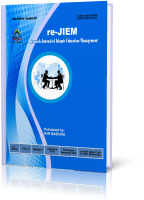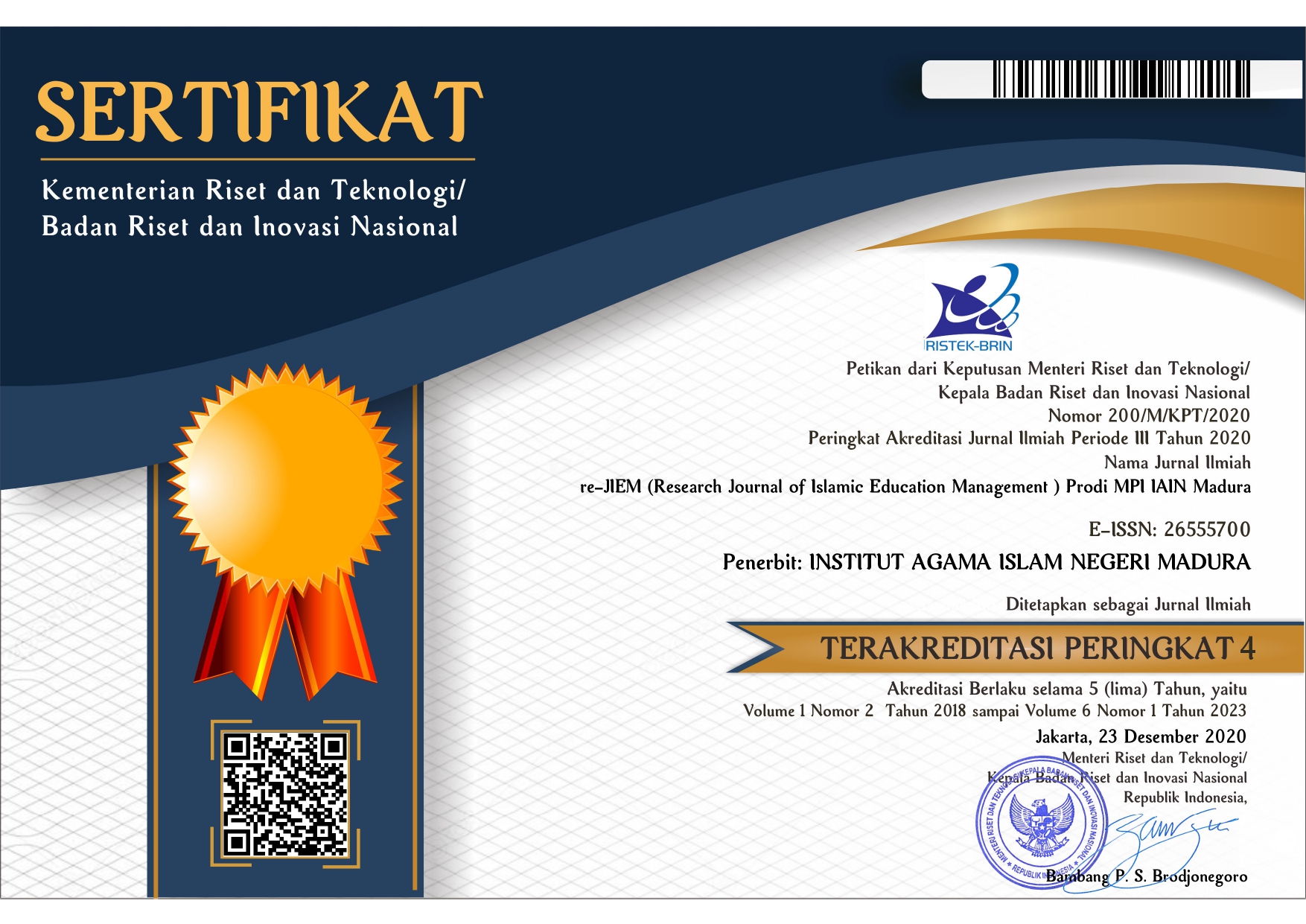HUMAN RESOURCE MANAGEMENT STRATEGY IN IMPROVING TEACHER PROFESSIONALISM IN PESANTREN
 Abstract views: 206
,
Abstract views: 206
,
 PDF downloads: 111
PDF downloads: 111
Abstract
This study examines human resource management (HRM) in enhancing teacher professionalism at Pondok Pesantren Almunawwaroh Tahfiz Walhadist Sungai Misang. Employing a descriptive qualitative approach, the research reveals that teacher professionalism encompasses not only pedagogical competence but also moral integrity, scholarly commitment, and multifaceted roles as educators, spiritual mentors, and community leaders. The pesantren’s HRM system integrates Islamic values into planning, morally grounded recruitment, continuous training, multi-source performance evaluation, and genuine support for teacher well-being, despite financial constraints. Enabling factors include visionary leadership, a spiritually rooted learning culture, and institutional commitment to professional development. Key challenges involve limited funding, traditional management practices, and insufficient external collaboration. The pesantren’s success in producing graduates who excel academically while demonstrating spiritual maturity underscores how HRM aligned with Islamic principles; such as tazkiyah (self-purification), ikhlas (sincerity), and tawakkul (trust in God) can foster holistic education. These insights offer valuable lessons for both religious and mainstream educational institutions on harmonising professional standards with ethical and spiritual foundations
Downloads
References
Ababneh, Hayel, and Alex Avramenko. “Impact of Islamic Values on HRM Practices: An Empirical Study of Jordanian Universities.” International Journal of Business Excellence 10 (2016): 1–19. https://api.semanticscholar.org/CorpusID:155448920.
Adlini, Miza Nina. “Tarbiatuna: Journal of Islamic Education Studies.” Tarbiatuna: Journal of Islamic Education Studies 4, no. 1 (2023): 52–63.
Al-Ayubbi, Syaefuddin Ahrom. “Kepemimpinan Kiai Dalam Pembaharuan Pendidikan Pesantren Di Era Disruupsi.” Jurnal Of Social Movements 1, no. 2 (2021): 130–39.
Alhashmi, Mariam, and Jase Moussa-Inaty. “Professional Learning for Islamic Education Teachers in the UAE.” British Journal of Religious Education 43, no. 3 (2021): 278–87. https://doi.org/10.1080/01416200.2020.1853046.
Apud. “Strategi Peningkatan Mutu Guru Sekolah Di Lingkungan Pesantren.” Adaara: Jurnal Manajemen Pendidikan Islam 10, no. 1 (2020): 87–98. https://doi.org/10.32678/tarbawi.v4i02.1227.
Astomo, Putera. “Politik Hukum Penyelenggaraan Sistem Pendidikan Nasional Yang Responsif Di Era Globalisasi.” Masalah-Masalah Hukum 50, no. 2 (2021): 172–83. https://doi.org/10.14710/mmh.50.2.2021.172-183.
Bahzar, Moh. “Authentic Leadership In Madrassas: Asserting Islamic Values in Teacher Performance.” Journal of Social Studies Education Research 10 (2019): 259–84. https://api.semanticscholar.org/CorpusID:150657578.
Efendi, Safrijal, Sri Nurabdiah Pratiwi, and Emilda Sulasmi. “Manajemen Strategis Kepala Sekolah Dalam Pengembangan Sumber Daya Manusia Untuk Meningkatkan Profesional Kerja Tenaga Pendidikan Dan Kependidikan Di SMK Muhammadiyah 8 Medan Strategic Management Of.” EduTech 9, no. 1 (2023): 95–103.
Fadhil, Rahmat, Taufik Djatna, and Mohamad Syamsul Maarif. “Analysis and Design of a Human Resources Performance Measurement System for the Nutmeg Oil Agro-Industry in Aceh.” Journal of Regional and City Planning 28 (2017): 99–110. https://api.semanticscholar.org/CorpusID:67438363.
Fauzi, Achmad, and Kemas Imron Rosadi. “Faktor-Faktor Yang Mempengaruhi Paradigma Berpikir Kesisteman Dalam Pendidikan Islam: Globalisasi, Manajemen Lembaga Dan Mutu Pendidikan.” Jurnal Ilmu Hukum, Humaniora Dan Politik 2, no. 2 (2022): 183–97. https://doi.org/10.38035/jihhp.v2i2.936.
Fauzi, Imron, Ubaidillah Ubaidillah, Nino Indrianto, Aminulloh Aminulloh, and Uwaisah Asshuwaifiyah. “The Pattern of Development of Competence, Commitment, and Motivation of Teachers in Pesantren.” AL-TANZIM: Jurnal Manajemen Pendidikan Islam 6, no. 4 (2022): 1175–89. https://doi.org/10.33650/al-tanzim.v6i4.3703.
Firdaus, Muhammad Aditya, Sofia Ratna Awaliyah F, and Mohamad Erihadiana. “Manajemen Peserta Didik Pendidikan Islam.” Islamic Management: Jurnal Manajemen Pendidikan Islam 5, no. 01 (2022): 41. https://doi.org/10.30868/im.v5i01.1991.
Georgieva, Penka V., Ivan P. Popchev, and Stanimir N. Stoyanov. “A Multi-Step Procedure for Asset Allocation in Case of Limited Resources.” Cybernetics and Information Technologies 15, no. 3 (2015): 41–51. https://doi.org/10.1515/cait-2015-0040.
Gunawan, Noviawati, Nuryadin, Ulpah Nupusiah, Yudi Saputra, and Yayat Hidayat. “Pengelolaan Sumber Daya Manusia Dalam Mengembangkan Mutu Pendidikan.” Jurnal Ilmiah Wahana Pendidikan 8, no. 13 (2022): 149–55.
Ma’arif, Muhammad Anas, Mauhibur Rokhman, M. Alfin Fatikh, Ari Kartiko, Ahmadi, and Moch Sya’Roni Hasan. “Kiai’S Leadership Strategies in Strengthening Religious Moderation in Islamic Boarding Schools.” Jurnal Ilmiah Peuradeun 13, no. 1 (2025): 23–48. https://doi.org/10.26811/peuradeun.v13i1.1168.
Ma`arif, Muhammad Anas, Lusia Mumtahana, Sunarno, Arif Mansyuri, and Ali Nasith. “Developing Pesantren Educator Resources through Optimizing the Learning Organization.” Nazhruna: Jurnal Pendidikan Islam 6, no. 3 (2023): 475–91. https://doi.org/10.31538/nzh.v6i3.4415.
Ma`arif, Muhammad Anas, Muhamamd Husnur Rofiq, Shakila Kausar, Akhmad Sirojuddin, Ari Kartiko, and Moch Sya roni Hasan. “Shaping Students’ Moderate Islamic Character At Madrasah.” Jurnal Pendidikan Islam 10, no. 2 (2024): 323–35. https://doi.org/10.15575/jpi.v10i2.34029.
Mahadiputra, Bagus Oka, and Noni Antika Khairunnisah. “Pengelolaan Manajemen Sumber Daya Manusia Dalam Upaya Meningkatkan Kinerja Dan Motivasi Melalui Reward System Pada Karywawan Pegadaian Cabang Lombok Utara.” Business Management 2, no. 2 (2023): 135–41. https://doi.org/10.58258/bisnis.v2i2.6499.
Moh, Masnun. “The Visionary Leadership of the School Principal for Improving the Quality of Education.” Journal of Ecohumanism 6798 (2024): 3297–3304. https://doi.org/https://doi.org/10.62754/joe.v3i8.4971.
Muhammad Aditya Firdaus, and Rinda Fauzian. “Pendidikan Akhlak Karimah Berbasis Kultur Pesantren.” Jurnal Pendidikan Islam 11, no. 2 (2020): 136–51. https://doi.org/10.22236/jpi.v11i2.5888.
Pamungkas, Yudha Catur, Lilik Hamidah, and Ryan Purnomo. “Problematika Ekonomi Dalam Dakwah : Studi Realita Akses Pendidikan Di Pondok Pesantren Dan Dampak Biaya.” Kamaya: Jurnal Ilmu Agama 7, no. 4 (2024): 38–48.
Pedersen, Kristin Warr. “Supporting Collaborative and Continuing Professional Development in Education for Sustainability through a Communities of Practice Approach.” International Journal of Sustainability in Higher Education 18 (2017): 681–96. https://api.semanticscholar.org/CorpusID:151459482.
Purwanto, Yedi, Aep Saepudin, and Sofaussamawati. “The Development of Reflective Practices for Islamic Religious Education Teachers.” Jurnal Pendidikan Islam 9, no. 1 (2023): 107–22. https://doi.org/10.15575/jpi.v0i0.24155.
Putra, Aditya Halim Perdana Kusuma, Daduk Merdika Mansur, Maria Ulfah, Nurmiati, and Ismail Hajiali. “Key Factors of Business Sustainability: Strengthening Leadership, Psychology, and Fairness Aspects from an Islamic-Management Perspective.” Nurture 17, no. 4 (2023): 694–710. https://doi.org/10.55951/NURTURE.V17I4.500.
Ramdhani, Muhammad Rendi, and Robiatul Adawiyah. “Strategi Peningkatan Kompetensi Guru Sekolah Kejuruan (SMK) Islam Swasta Pada Era 4.0.” Progressive of Cognitive and Ability 2, no. 3 (2023): 180–91.
Sadiah, Dewi. “Developing Pesantren Education Quality Thorugh Radicalism Prevention Program for Santri.” Jurnal Pendidikan Islam 8, no. 1 (2022): 63–74. https://doi.org/10.15575/jpi.v8i1.17947.
Sampaleng, Donna, and Baharuddin Baharuddin. “Analisis Manfaat Perencanaan Pendidikan Dalam Otonomi Daerah Pada Pendidik Dan Tenaga Kependidikan Di Kecamatan Babela.” Al Qalam: Jurnal Ilmiah Keagamaan Dan Kemasyarakatan 17, no. 2 (2023): 14. https://doi.org/10.35931/aq.v17i2.1953.
Setiadi, Hari. “Model Bisnis Alumni Pondok Pesantren.” Jurnal Pendidikan Agama Islam 2, no. 1 (2023): 125. https://doi.org/10.52434/jpai.v2i1.2933.
Suwendi, Cipta Bakti Gama, Muhammad Fawwaz Farhan Farabi, Farkhan Fuady, and Arman. “Roles and Challenges of Pesantren Intellectual Networks.” Jurnal Ilmiah Islam Futura 24, no. 2 (2024): 453–70. https://doi.org/10.22373/jiif.v24i2.23134.
Triarsuci, Damara, Haifa Tasya Al- Qodri, Shafa Adinda Rayhan, and Arita Marini. “Manajemen Sumber Daya Manusia Dalam Pengelolaan Infrastruktur Sekolah Dasar: Tantangan Dan Solusi.” Jurnal Pendidikan Guru Sekolah Dasar 1, no. 3 (2024): 15. https://doi.org/10.47134/pgsd.v1i3.551.
Winarsih, Ratih, Atika Rukminastiti Masrifah, and Khoirul Umam. “The Integration of Islamic Commercial and Social Economy Through Productive Waqf To Promote Pesantren Welfare.” Journal of Islamic Monetary Economics and Finance 5, no. 2 (2019): 321–40. https://doi.org/10.21098/jimf.v5i2.1065.
Zakaria, Abd Razak, Karwadi, Ali Mumin Budiman, Mubarok Fatahillah, and Abd. Rasyid M Akib. “Strategic Management Practices In Pesantren: Innovations For Enhancing Educational Quality And Organizational Sustainability.” Malaysian Online Journal of Educational Management, 2025. https://api.semanticscholar.org/CorpusID:280383877.
Copyright (c) 2025 Ahmad Arrifa’i, Risnita, and Sodiah

This work is licensed under a Creative Commons Attribution-ShareAlike 4.0 International License.
Authors who publish with this journal agree to the following terms:
Authors retain copyright and grant the journal the right of first publication with the work simultaneously licensed under a Creative Commons Attribution-ShareAlike 4.0 International License that allows others to copy and redistribute the material in any medium or format with an acknowledgment of the work's authorship and initial publication in this journal and also allows them to remix, transform, and build upon the material for any purpose, even commercially, with contributions under the same license as the original.
Authors are able to enter into separate, additional contractual arrangements for the non-exclusive distribution of the journal's published version of the work (e.g., post it to an institutional repository or publish it in a book), with an acknowledgment of its initial publication in this journal.
Authors are permitted and encouraged to post their work online (e.g., in institutional repositories or on their website) prior to and during the submission process, as it can lead to productive exchanges, as well as earlier and greater citation of published work.




















